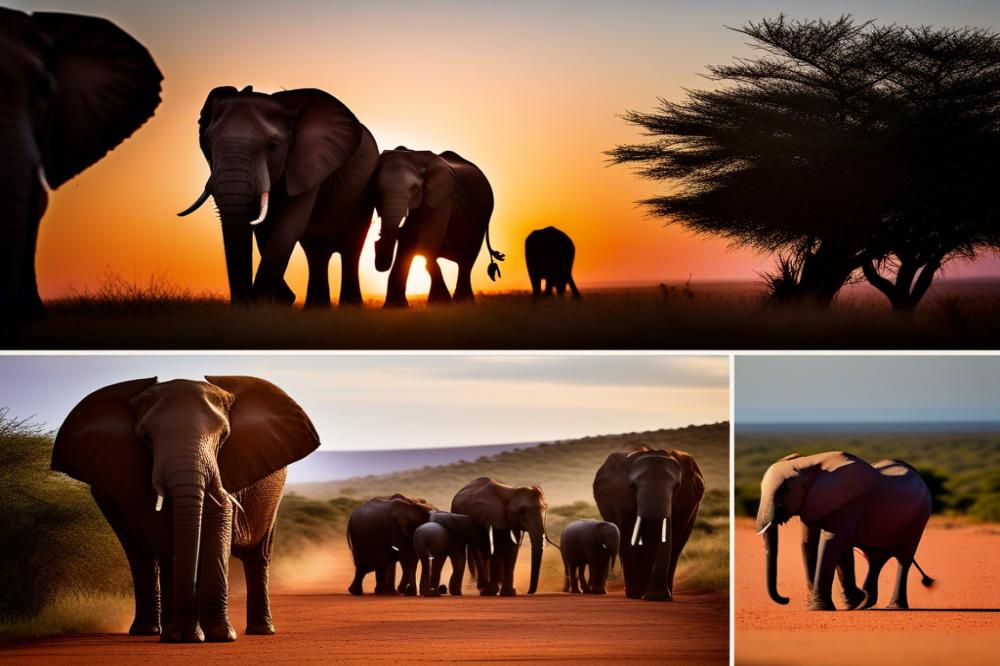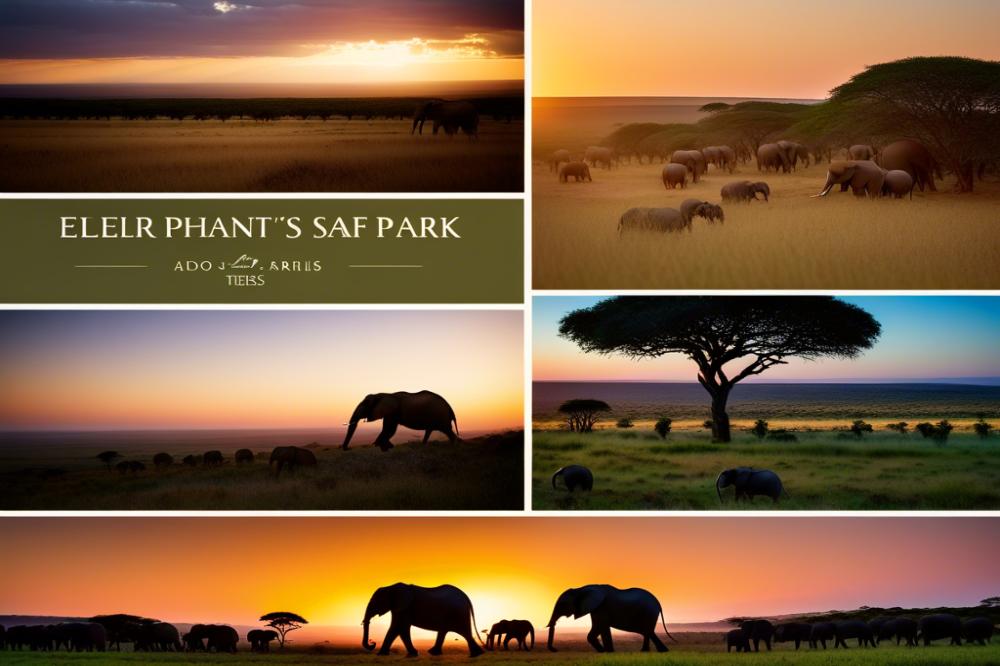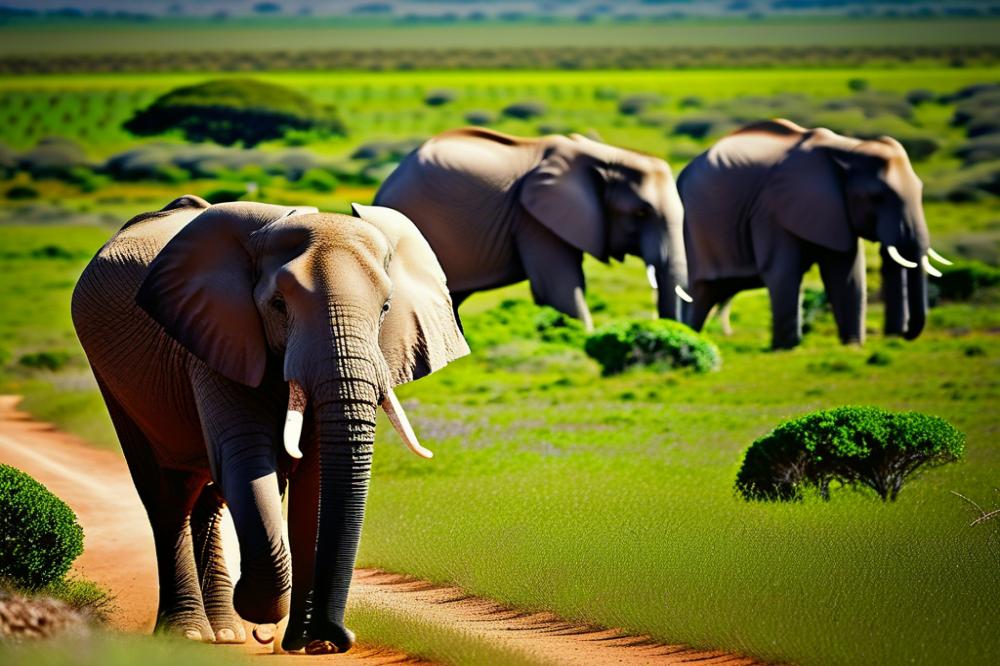Introduction
Elephant-Back Safaris offer a captivating way to experience African wildlife. Riding atop these gentle giants, visitors gain a different perspective of nature. The thrill of gliding through the bush while observing other animals is unmatched. This adventurous pursuit not only creates memorable encounters but also fosters deeper connections with wildlife.
Situated in the heart of South Africa, Addo Elephant Park stands out as a premier destination. Known for its abundant elephant population, the park invites travelers to explore its diverse ecosystem. Guests can enjoy various safari activities, from guided tours to nature photography, immersing themselves in the beauty of the landscape. It serves as a vital sanctuary for elephant conservation, ensuring these magnificent creatures thrive.
Eco-tourism is crucial in Southern Africa. It promotes responsible travel while benefiting local communities and wildlife. Adventure travel, such as participating in Elephant-Back Safaris, contributes to conservation efforts and raises awareness. People can engage with African wildlife in meaningful ways, leading to a greater appreciation for the natural world. Experiences like these help promote sustainable practices that protect the planet for future generations.
Elephant-Back Safaris

Elephant-back safaris offer a distinct adventure travel opportunity in South Africa‘s stunning Addo Elephant Park. During these guided tours, participants ride atop trained elephants, allowing them to explore the park in a way few other safari activities can provide. While seated high above the ground, visitors can engage in wildlife viewing with an unparalleled perspective. This experience enhances nature photography endeavors, capturing African wildlife in their natural environment without disturbing their behavior.
Experiencing wildlife from an elephant’s viewpoint adds a sense of wonder and excitement. Riders can observe the park’s diverse ecosystems and spot animals from an elevated position. The slow pace set by the elephants promotes a deeper connection with the surroundings. Moreover, participants often gain insights into the gentle giants themselves, understanding their behavior and social structures.
Connecting to elephant conservation efforts is essential in this context. Many operators emphasize protecting both the elephants and their habitats. A portion of the proceeds from these eco-tourism ventures often supports local conservation programs. This means that each safari contributes to preserving the very environment visitors marvel at, aligning adventure travel with a greater purpose.
Ethical considerations play a significant role in the choice of safari operators. Responsible organizations prioritize the well-being of their elephants and avoid any practices that can harm them. They focus on creating a respectful relationship between the elephants and their caretakers. Ensuring that rides are not only enjoyable but also promote the animals’ best interests fosters an environment of care and conservation.
Exploring Addo Elephant Park

Addo Elephant Park stands as a testament to South Africa’s diverse ecosystems and habitats. Spanning over 180,000 acres, the park features dense thickets, open savannas, and rugged mountains. Each environment supports a variety of plant and animal life, making it a paradise for eco-tourism enthusiasts. Within its boundaries, visitors can observe the balance of nature through its rich biodiversity.
Wildlife viewing is one of the main attractions here. The park is home to what many call the Big Seven: elephants, lions, leopards, rhinoceros, buffalo, great white sharks, and southern right whales. Tourists can witness these magnificent creatures in their natural habitats. Addo’s elephants are especially iconic, as the park plays a significant role in elephant conservation efforts.
Guided tours allow visitors to delve deeper into the wildlife experience. Knowledgeable guides lead safari activities, enhancing your adventure travel experience. They provide insights on the behaviors and habitats of the animals. Nature photography opportunities abound, making it a dream for both amateurs and pros alike. Capture stunning images of animals against the backdrop of the South African landscape.
Visitors can explore the park via various safari activities. Options range from self-drive adventures to scheduled game drives. Each offers a unique perspective of this wildlife haven. Walking trails are also available for those seeking a closer look at the flora and fauna. Engaging with nature in this way fosters a greater appreciation of African wildlife.
Eco-Tourism and Conservation

Elephant-back safaris offer a fascinating perspective on wildlife experience in South Africa’s Addo Elephant Park. These adventures draw in visitors eager for an unforgettable chance to engage with African wildlife. With every guided tour, travelers gain a deeper appreciation for the majestic elephants and their habitats.
Local communities benefit significantly from eco-tourism. Jobs created by safari activities support families and provide income. As tourists arrive for their adventures, nearby towns thrive. This economic boost can help promote conservation efforts, as community members recognize the value of protecting wildlife.
Engaging in eco-tourism plays a vital role in preserving nature. When visitors choose responsible travel options, they contribute to sustainable practices. Parks like Addo prioritize eco-friendly initiatives. This focus can lead to better protection for endangered species and their ecosystems.
Each tourist can make a difference. Participating in wildlife viewing during their visit raises awareness about elephant conservation. Many operators encourage donations or offer programs that directly fund efforts to protect elephants and their habitats. Nature photography also serves a purpose; capturing stunning images can foster a love for wildlife and promote conservation messages far beyond South Africa.
Adventure travel isn’t just about excitement; it’s about responsibility. Tourists should be mindful of their impact on the environment. Choosing to support local businesses and sustainable practices ensures a balanced approach to enjoyment and preservation. By taking simple steps, visitors can leave a positive mark on the conservation landscape.
Nature Photography and Wildlife Viewing

Elephant-back safaris in South Africa’s Addo Elephant Park offer amazing opportunities for nature photography. Riders can capture stunning shots of African wildlife roaming freely. Imagine taking a picture of a herd of elephants from the back of your gentle giant. The elevated perspective allows for unique angles that ground-level views cannot provide. Your camera can become a tool for conservation by showing the beauty of these magnificent creatures.
When planning to take photos on your journey, keep a few tips in mind. Always be ready for spontaneous moments. Wildlife can surprise you at any time. Use a telephoto lens to get closer views without disturbing the animals. Lighting can change quickly in the wild, so be aware of your surroundings. Early mornings and late afternoons often provide the best light for photography. Patience is key; waiting for the right moment can yield breathtaking results.
Experiences gained while riding elephants deepen your wildlife viewing. A gentle sway as the elephant moves highlights every sound and sight of the terrain. This connection with the environment can enhance your understanding of their behavior. Guided tours often share stories that make observing animals even more enriching. The thrill of stepping into their world from a higher vantage point cannot be overstated.
Eco-tourism is thriving in this region. By participating in these safaris, travelers support elephant conservation efforts. You become part of a movement that values and protects Africa’s animals and ecosystems. Adventure travel takes on new meaning when witnessing the interaction of elephants with other wildlife. This immersive experience creates lasting memories while promoting preservation.
Planning Your Safari Adventure
Planning an elephant-back safari in Addo Elephant Park involves several key considerations. First, think about the best times to visit. Many travelers recommend going between May and September. During these months, the weather is mild, and wildlife viewing is at its peak. Additionally, this period allows for better photography opportunities due to clearer skies.
Next, consider what you can expect during your safari experience. A typical day may include riding elephants through beautiful landscapes, spotting African wildlife, and participating in various safari activities. Guided tours often provide a deeper understanding of elephant conservation and the ecosystem. Knowledgeable guides share insights about the elephants and their environment, enhancing the adventure travel experience.
When choosing a tour operator, research is crucial. Look for reputable companies that prioritize eco-tourism. Many operators offer different packages tailored to various preferences. Some focus on lengthy excursions, while others may provide short day trips. Always check reviews and consult with others who have participated in similar tours.
Additionally, think about the type of experience you want. If you’re interested in nature photography, select a package that includes opportunities to capture stunning wildlife images. Some tours also include additional activities, like hiking or birdwatching. Make sure to confirm what is included in your tour to match your interests.
Ultimately, planning an elephant-back safari calls for thoughtful consideration of timing, activities, and operators. With proper preparation, you will embark on an enriching wildlife experience that supports African wildlife and conservation efforts.
Final Thoughts on Elephant-Back Safaris in Addo
The adventure of riding elephants in Addo Elephant Park is truly special. Participants gain an intimate view of the natural surroundings, seeing wildlife in a way that other safari options cannot provide. Connecting with these majestic animals offers travelers a unique perspective on their behaviors and habitats. Visitors learn about the significant role elephants play in the ecosystem, deepening their appreciation for conservation efforts.
Choosing this type of journey goes beyond just enjoyment. It supports responsible tourism practices that contribute to wildlife conservation in South Africa. When people engage in eco-tourism, they help fund initiatives that protect animals and their environments. This is vital for the future of global wildlife. It’s not just a holiday; it’s a chance to make a difference.
Preserving the wonders of African wildlife ensures future generations can experience these remarkable creatures in their natural habitats. The story of these elephants is one that continues to unfold. By participating in experiences like this, travelers become part of a larger narrative, one that emphasizes the importance of respect for nature and its inhabitants.
In summary, riding elephants in Addo Elephant Park is more than an adventure; it is a vital contribution to the well-being of wildlife. Take the opportunity to not only witness these magnificent animals but also to support conservation efforts that will help safeguard their future. Enjoy the journey, and cherish the memories you create!



